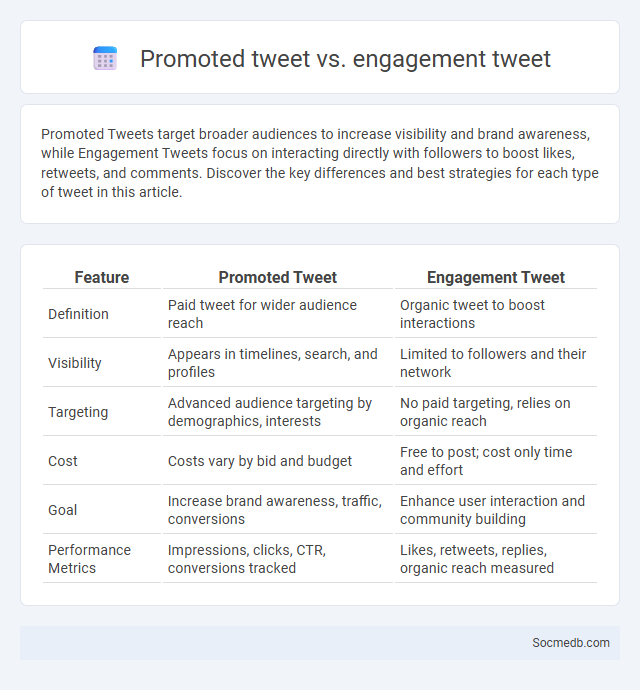
Photo illustration: Promoted tweet vs Engagement tweet
Promoted Tweets target broader audiences to increase visibility and brand awareness, while Engagement Tweets focus on interacting directly with followers to boost likes, retweets, and comments. Discover the key differences and best strategies for each type of tweet in this article.
Table of Comparison
| Feature | Promoted Tweet | Engagement Tweet |
|---|---|---|
| Definition | Paid tweet for wider audience reach | Organic tweet to boost interactions |
| Visibility | Appears in timelines, search, and profiles | Limited to followers and their network |
| Targeting | Advanced audience targeting by demographics, interests | No paid targeting, relies on organic reach |
| Cost | Costs vary by bid and budget | Free to post; cost only time and effort |
| Goal | Increase brand awareness, traffic, conversions | Enhance user interaction and community building |
| Performance Metrics | Impressions, clicks, CTR, conversions tracked | Likes, retweets, replies, organic reach measured |
Introduction to Twitter Advertising Options
Twitter advertising options include Promoted Tweets, which expand the reach of individual posts to targeted audiences using keywords, interests, and demographics. Twitter also offers Promoted Accounts to increase follower counts by showcasing profiles to potential users likely to engage. These advertising tools enable businesses to drive website traffic, boost brand awareness, and generate leads through tailored targeting and real-time engagement metrics.
What is a Promoted Tweet?
A Promoted Tweet is a type of paid advertisement on Twitter that appears in users' timelines, search results, or profiles to increase visibility and engagement. Your promoted content targets specific audiences based on demographics, interests, or behaviors to maximize reach and effectiveness. This tool helps brands amplify messages, drive website traffic, or boost conversions through strategic campaign management.
Understanding Engagement Tweets
Engagement tweets on social media drive interactions such as likes, retweets, and replies, boosting visibility and reach. Crafting content with compelling questions, calls to action, or trending hashtags increases user participation and fosters community building. Analyzing metrics like engagement rate and click-through rate helps optimize future tweets for maximum audience connection.
Promoted Tweet vs Engagement Tweet: Key Differences
Promoted Tweets are paid advertisements designed to reach a broader audience beyond an account's followers, often targeting specific demographics for increased visibility. Engagement Tweets aim to boost interaction such as likes, retweets, and replies organically within an existing audience, enhancing content reach through user participation. The key difference lies in Promoted Tweets leveraging paid targeting, while Engagement Tweets rely on organic user activity to expand influence.
Objectives: Awareness vs Engagement Campaigns
Social media campaigns with an awareness objective aim to increase brand visibility and reach a broad audience, using metrics like impressions and reach to measure success. Engagement campaigns focus on fostering interactions such as likes, comments, shares, and clicks, building a deeper connection with your audience. You should choose the campaign type based on whether your goal is to maximize exposure or to drive meaningful user participation.
Targeting and Reach in Promoted vs Engagement Tweets
Promoted Tweets use advanced targeting options like demographics, keywords, and interests to precisely reach Your desired audience, resulting in higher visibility and potential conversions. Engagement Tweets rely on organic interactions and can generate authentic user responses but typically have limited reach compared to paid promotion. Combining both strategies optimizes social media performance by balancing targeted reach with genuine engagement.
Cost Structure and ROI Comparison
Social media platforms typically incur costs related to content creation, paid advertising, analytics tools, and personnel management, which vary depending on the campaign's scale and complexity. Your return on investment (ROI) can be measured through engagement metrics, conversion rates, and customer acquisition costs, often proving social media to be more cost-effective compared to traditional marketing channels. Businesses optimizing their social media strategy benefit from scalable budgets and real-time performance tracking, enhancing overall marketing efficiency.
Creative Strategies for Both Formats
Creative strategies for social media content should cater to the unique strengths of both video and image formats, leveraging video's dynamic storytelling capabilities with high engagement rates and image posts' quick visual impact and shareability. Utilizing platform-specific features like Instagram Reels and TikTok's short-form video or Pinterest's rich pins can maximize reach and audience interaction. Incorporating user-generated content, distinctive branding elements, and interactive calls-to-action enhances visibility and drives higher conversion across both formats.
Measuring Success: Metrics and Analytics
Measuring success on social media involves tracking key performance indicators such as engagement rates, follower growth, and click-through rates to evaluate content effectiveness. Analytics tools like Facebook Insights, Instagram Analytics, and Twitter Analytics provide detailed data on audience demographics, post reach, and user interaction patterns. Utilizing conversion tracking and sentiment analysis further refines strategy by linking social media efforts to business objectives and brand perception.
Choosing the Right Campaign Type for Your Goals
Selecting the right social media campaign type depends on your specific marketing objectives, such as brand awareness, lead generation, or sales conversion. Campaign options like engagement ads, video promotions, or retargeting strategies offer targeted results tailored to your audience's behavior. Analyzing platform-specific metrics ensures your campaign effectively meets your goals and maximizes return on investment.
 socmedb.com
socmedb.com